Scripted.com Review: How Well Does It Work For Businesses?

In the wide world of buying content online, there are a ton of different sites you can use. I've written about some of them before in brief, such as in my list of 25 sites you can use to hire a blogger. Today, I want to do a deeper dive into one of them: Scripted.com.
Update 2024: With ChatGPT, most content mills have seen a sharp decline in quality and a massive increase in the number of writers. If you've seen any major changes lately in Scripted.com or others (like Textbroker), you can most likely attribute it to this change. Scripted.com attempts to detect AI content but this is not an effective countermeasure. You can read about their AI detection technology here.
What is Scripted?
Scripted, found at Scripted.com, is (at its core) a content mill. They facilitate the relationship between writer and publisher by providing a platform where publishers (that's you) can post assignments and projects, writers can pick them up and write them, site editors can review them, and money can change hands.
Content mills and platforms like this stand in contrast to something like the ProBlogger job board, where you can post a job opening for a writer and have writers apply, but everything else – from pay to editing to plagiarism detection – is your own responsibility.

There are benefits to content mills and their upscale brethren. Primarily it saves you time. Every moment where you might have a contract dispute, every minute you spend dealing with invoices, every editing request where you have to negotiate with a writer; that's all handled by the platform instead of by you. You're free to simply post an assignment, get writing in return, and post it.
The exchange for this is, of course, money. Hiring a writer directly is generally cheaper than hiring the same writer through a content mill because the content mill takes its own cut of each sale. You also might not be able to contact writers directly. Sites like Textbroker, for example, actively monitor and censor communications between client and writer to avoid publishers poaching their good writers. Some writers have distinctive enough usernames you can look them up, but that's not always possible.
Anyway, about Scripted itself. Scripted is a content mill that provides a variety of different kinds of writing, from social media posts and newsletter copy to website content and blog posts. The process is pretty simple.
- You join Scripted. They have a 30-day free trial of their membership, but you still have to pay for the content you order.
- You create a project. Projects can be anything from a single one-off white paper to an ongoing series of blog posts, and Scripted offers a variety of tools to help you put together a project with the right requirements to attract proposals from talented writers.
- Writers submit proposals. You have a pile of pitches or applications, and can choose to accept and hire any number of the writers. Once you accept a proposal, the writer gets started working and sends you their finished product's first draft.
- You review the writing. Once you receive a draft, you have a few days to either approve it or request revisions. If you approve it, the content becomes yours to do with as you wish. If you request edits, you go back and forth with the writer until one of you drops the project or you are satisfied with the content and accept it.
You don't have to pay for the content you don't like, unless you ignore it long enough to hit the auto-accept period. This process exists to protect writers from scammy businesses, by the way. Content mills that don't use a process like this have a big problem with businesses that order content, take it to use, and never pay for it. Scripted (and mills like Writer Access and Textbroker) use an escrow system to take your money and hold it to pay for content unless it's explicitly rejected. That way writers aren't burned and don't leave the platform.
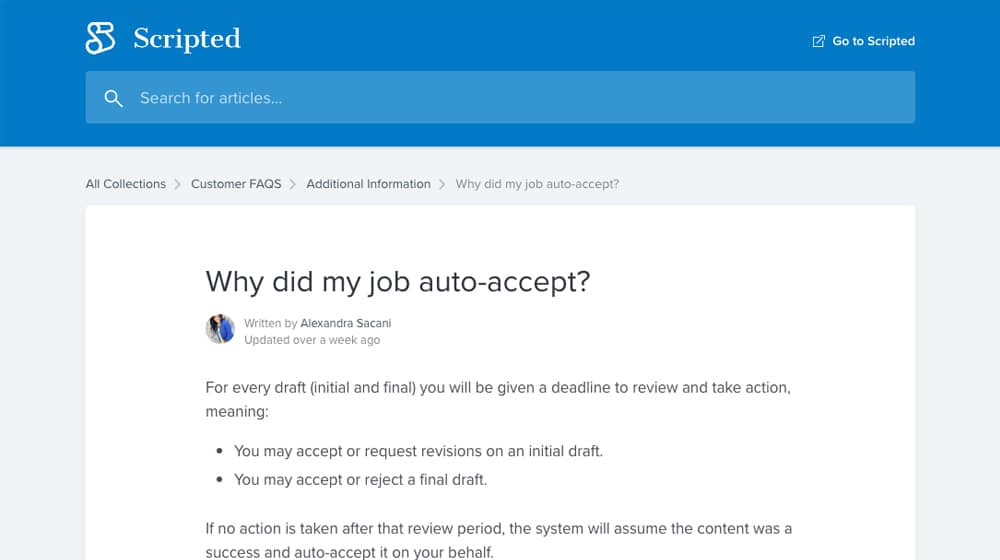
It's worth mentioning that Scripted currently does not have writers in the state of California. This is a bummer if you want CA-local writing, but it's due to the AB5 legislation California passed last year that threw a lot of gig work and freelancing into chaos. You can read more about that here. Basically, until the legal implications shake out, a lot of freelance hubs, content mills, and other portals have stopped working with CA-based freelancers.
So, speaking of money, how much does Scripted cost?
Scripted Pricing
So how much can you expect to be paying to use Scripted? There are two costs you have to keep in mind, and you'll be paying both.
First, there's the membership fee. The membership fee determines what tools you have access to, what pools of writers see your proposals, and whether or not you have an agency representative to manage it for you. Big brands, for example, might have a dedicated account manager working for Scripted who handles everything for you and just delivers content to your blog. Smaller brands might need to use some of the other self-service platforms, as the fee may not justify their monthly usage.
For memberships, there are four tiers.
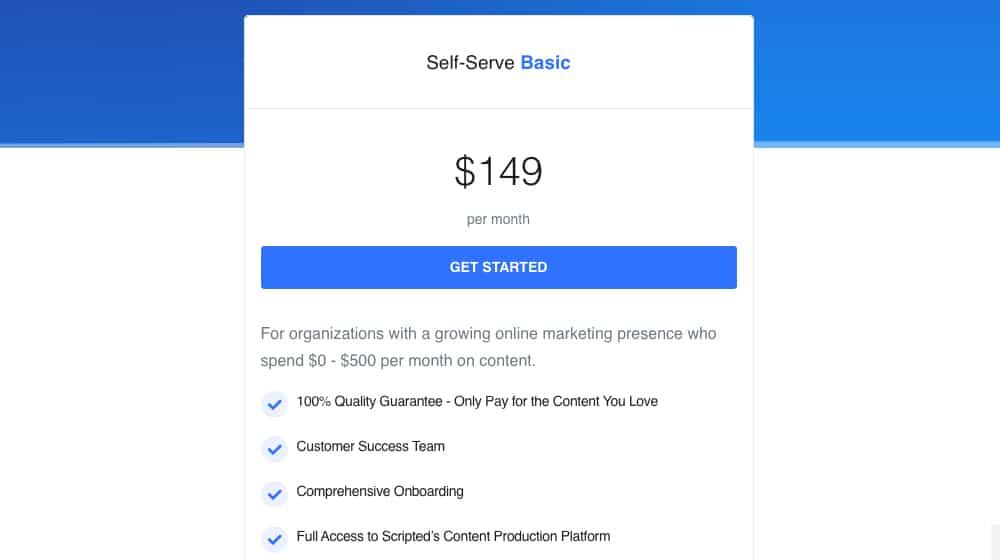
Basic is the cheapest plan and costs you $149 per month. You get their "only pay for what you love" guarantee, and you have access to their "customer success team", which is like an account manager for everyone on this tier. They don't learn specifics about your brand or customize things for you, but they can help. You also get onboarding, full access to their content production platform, and access to the basic writer pool.
The basic writer pool is a pool that all of Scripted.com's writers have access to and is generally the lowest quality. It's not necessarily bad, per se, but since there's no barrier to entry, there will be some writers who are less talented or where English is their second language. The quality will be more hit-or-miss, as compared to the Premium pool.
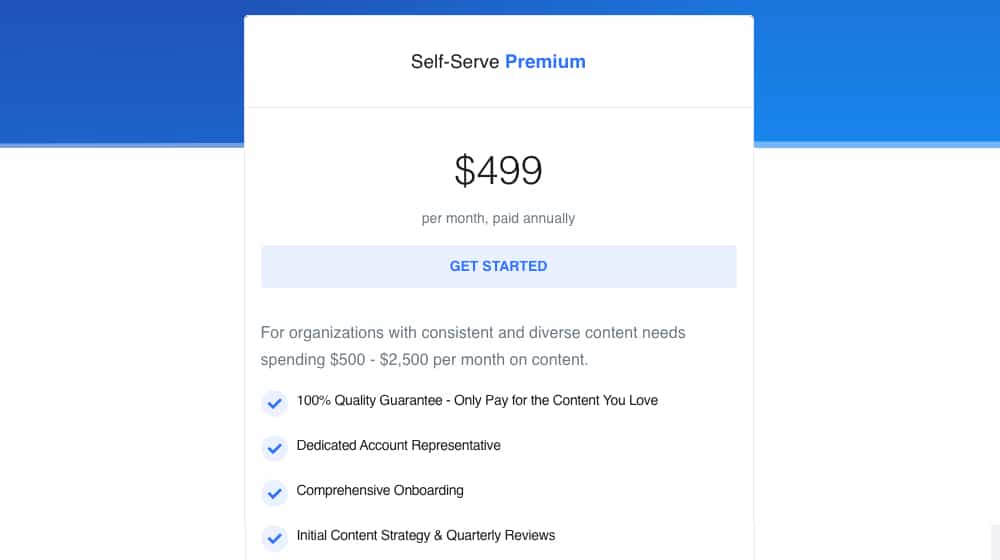
Premium is the next step up and is still a self-service platform. It costs $499 per month. Instead of the "customer success team" you have a dedicated account representative here. You also get an initial consult and quarterly reviews with that rep, to make sure you're satisfied and your content is still on target.
This tier also gives you access to the premium writer pool, which is a step up in both quality and expense. Premium writers tend to take more care in what they write, and you'll start to see familiar names there if you use it for a while.
This tier also gives you the ability to set up a brand profile and a style guide for writers who want to pitch to you, as well as things like discounted bulk content orders, a content promotion strategy guide, and optimized content briefs to help writers find your pitches.
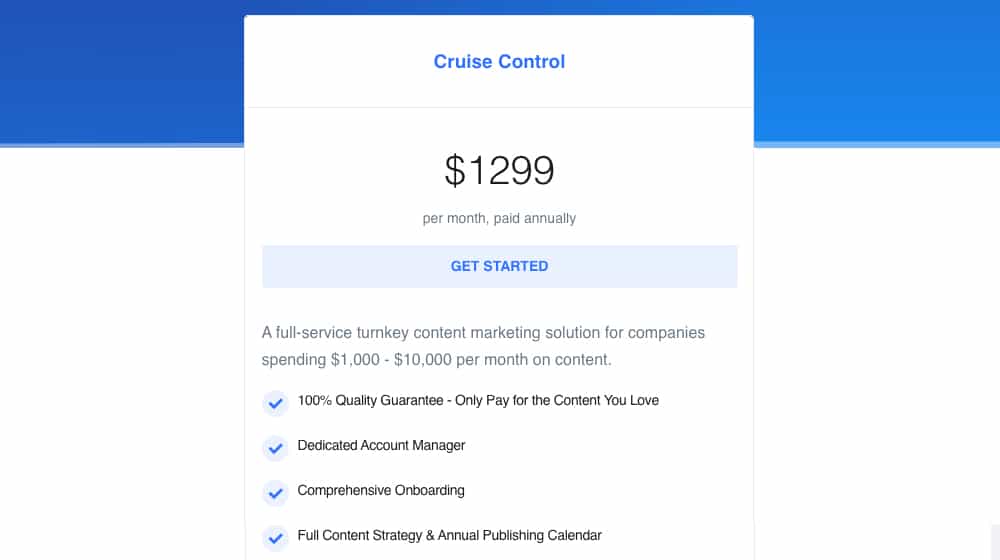
Cruise Control is the third tier and is the first of the managed plans. It's $1,299 per month. They give you everything in the Premium tier, but also give you an annual publishing calendar and a fully managed content production team. You can set up personal vetting for individual writer selection as well.
This plan is aimed at businesses that intend to be spending $1-$10k per month on content, so it's not for the cheap and small businesses out there. If you're serious about content, it's a good place to start, but you won't be using it to just get your feet wet.
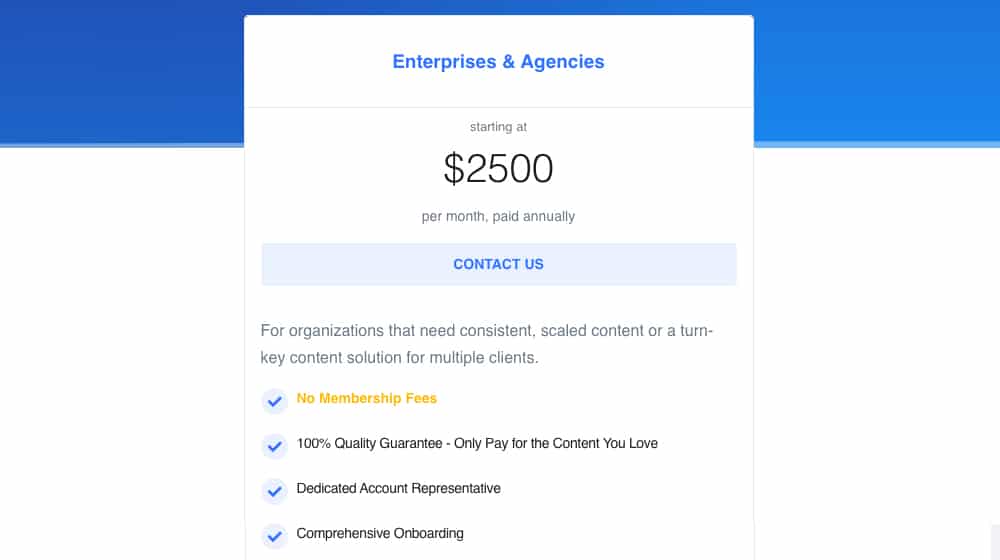
Enterprise and Agency is the final tier and, as the name implies, the pricing is a whopping $2,500 per month, scaling to your needs. They give you a ton of additional attention and resources, and it's mostly a managed service with quarterly consults and the chance to talk to your account rep at any time you're not satisfied.
The other price you have to pay is the price of the actual content. Remember, the membership price is just to gain access to the platform.
The actual content costs money as well.
How much does it cost? Well, Scripted changed their fee structures recently to be a lot more flexible and allow their best writers to name their prices. There's no public pricing page and very little in the way of guidelines.
Writers can earn anywhere from around $50-70 for 1000 words, which works out to something like 5-8 cents per word, as a minimum. Writers in the Premium pool and above can earn around 25 cents per word on average (or about $250 for 1,000-word articles), and I wouldn't be surprised if some of the best writers on the platform can charge even more. Paying $500 for a 2,000-word article isn't exactly cheap, especially when all they're doing is writing the post.
How does this translate into publisher prices? Normally a content mill takes a cut of the price, so when a writer is paid $14, the client is charged $21, or something to that effect. With Scripted, I'm not sure that's the case, because of the membership fees already going entirely to the platform. I have seen mention that the cheapest posts you submit to the writer pool are around $39, though, so it wouldn't surprise me.
Here's the thing. Scripted doesn't set the prices, they just deliver guidelines. These days, when a writer offers a proposal for your content pitch, they include not just what they would write, but the price point they would expect for that writing. This means you'll get a torrent of applications for your projects, and they can range dramatically in both quality and price.
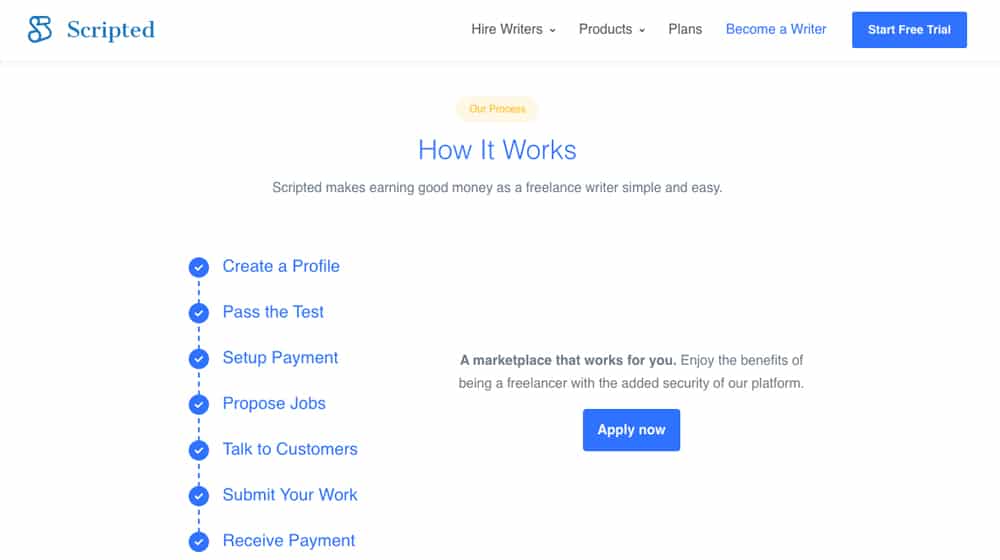
At the higher membership tiers, you can also browse through writers directly and choose specific writers to pitch to, if you want them. This can be a good way to pick writers you think would be a good match, but not all of those writers will be willing to actually work with you, for any number of reasons.
Writer profiles show information about the writer including things like their screen name and their expertise level for various industries, similar to the specialties system used by Writer Access.
You can also see things like their star ratings and reviews left by other clients. Scripted also gives writers a reliability rating, so you know if they're consistent with producing the content they promise.
So in general, pricing is more or less consistent with the quality levels of the writer. The best writers in the Premium pool charge more, but there's far less of a chance that you'll have spotty results with your content. It's up to you to judge their pitches, weigh their pricing, and accept the writers that you believe will work best for you.
The Pros and Cons of Scripted
That's the facts, so let's get to some analysis. Promises on landing pages are one thing, but how does actually using the platform shake out?
First of all, Scripted is pretty strict about pruning out underperforming writers, so their writer pool is pretty fresh and high quality for a content mill. They won't get you content as good as what you can get from true high-end freelancers, but it's still pretty solid quality.
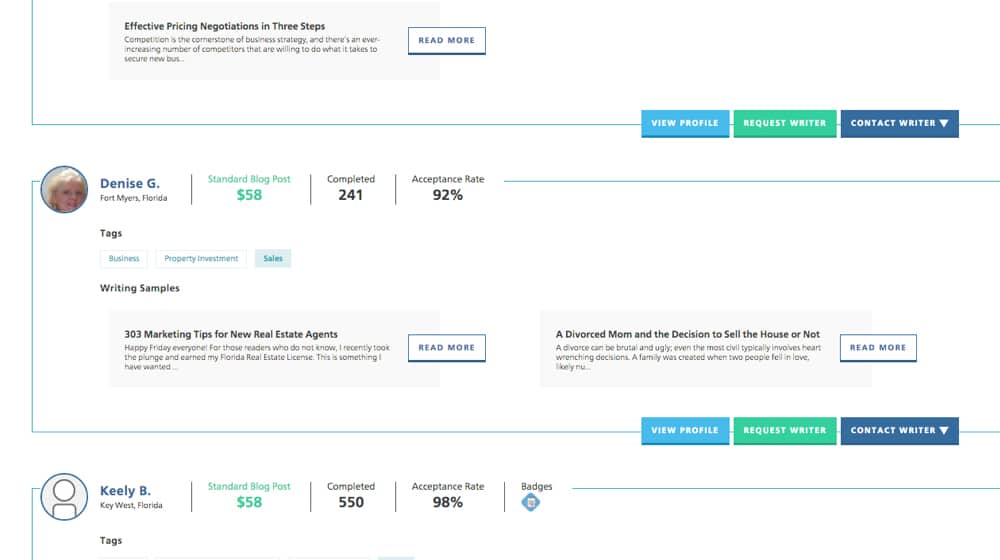
One downside to this is that, if a writer has a few bad days, gets a couple of bad reviews, or takes a vacation (or a medical leave of absence), they could be dropped from the platform abruptly. Even if you liked working with them, they can disappear, and there's not much you can do about it unless you can try to track them down off-site.
You can also get a wide range of content types and styles from Scripted. A lot of content mills only work with long-form content like blog posts, landing page copy, website copy, and so on. Scripted does everything from social media posts to video scripts to ebooks, so you can get pretty much any kind of content written for you on the site. Now, they won't produce a video for you, but they'll write the script for one.
Pricing can vary a lot depending on the writer. It's generally higher on average than other content mills, but lower than hiring a dedicated high-end freelancer.
Perhaps the biggest catch to the whole platform is the membership fee, to be honest. It's entirely possible to pay for the platform and fail to really use it. There's nothing you can do about it if that happens. Scripted won't refund you for the month you didn't use their site, and they auto-renew your membership so you have to remember to cancel if you aren't using it. Plus, they charge annually, and they have early cancellation fees. All in all, it's surprisingly easy to waste a lot of money with Scripted, which I'm sure they're happy about.
There are also a lot of reviews out there about the quality of the content Scripted delivers. Some of the posts are pretty old, but many of the criticisms remain valid today. I suppose when I say the quality of a post from Scripted is "pretty good" it just shows the depths of bad content I've seen on sites like Textbroker.

Basically, I just consider Scripted to be on the higher end of mid-range content mills. There are content production companies that charge similar amounts for higher quality content, and there are definitely sites that charge less for worse content. If you want truly high-end content you need to work directly with high-quality writers, though, and you're not likely to find them through sites like Scripted.
Your Reviews
This is one case where I'd really like to hear what you have to say. Have you used Scripted? If so, answer a few questions for me, if you please.
- How long ago did you use them? Scripted has changed a lot in the last couple of years, so more recent experience is more useful here.
- What tier of membership did you buy?
- How many of the features (tools, account managers, editorial calendar) did you use on the site, and how did you like them?
- How did you find the writer profiles? Were they useful, or was it pretty misleading?
- How was the writing quality? Different people can have vastly different experiences with the same site, so I'm curious how it went for you.
- How did it compare to other content firms you've used?
I'd like to hear your feedback on Scripted in particular, as it's one of the more interesting writer mills that has surfaced over the past few years.
Let me know about your experiences in the comments below!










September 13, 2020
Hey James! Glad I caught this article. Was about to subscribe with Scripted however, I think its best for me to just hire a writer. Do you know any site I can check?
September 15, 2020
Hey Jonathan!
If you're looking for a content farm, we wrote an article on Textbroker alternatives that has 20 different similar sites:
https://www.contentpowered.com/blog/textbroker-not-working-alternative/
You'll see Scripted on this list, but there are 19 others that you could look into.
If you're interested in hiring somebody to help you, whether it's a writer / marketer combo or an agency, we wrote a post on that as well:
https://www.contentpowered.com/blog/content-marketing-cost-business/
An agency can end up being a bit more cost-effective than hiring several employees. You'll need more than a writer if you want your blog to succeed. Writers usually aren't very good at marketing, and marketers usually aren't very good at writing.
I hope this helps 🙂
November 10, 2020
Haven't been a big fan of Scripted. Hiring a writer directly is cheaper and the writer gets paid more since they aren't getting fees taken out of their account to pay the content mill. Glad to see that I'm not the only one.
November 16, 2020
Hi Misty! Thanks for your input. How long have you used Scripted, and how many articles did you order? Where any of them any good? Curious to hear more about your experience.
January 05, 2021
Save your time, business, and the money! They will charge you an exorbitant amount even after you cancel and without a refund. $199/month. Run! There are great copywriters out there and better services and sites than this one. Unscrupulous, and kind of a scam.
January 08, 2021
Hi Hanne!
Yikes, this is the first bad review we’ve had for Scripted.com on here.
I would reach out to them to see if they could make that right for you with a refund.
That seems like a mistake.
Please keep us updated! They shouldn't be charging you if you’re not receiving service from them.
December 08, 2021
Having read this, I don't think I will ever consider subscribing to scripted. I'd rather work directly to a writer.
December 09, 2021
Hey Gregory!
Scripted still has some great writers and is as good of a service as any content mill.
You'll still face the same issues, though some content is excellent and some aren't great. That's the nature of content mills.
Content mills aren't necessarily the best option, but they're the most flexible and the cheapest.
I wrote a good post on content mills here, if you're interested: https://www.contentpowered.com/blog/content-writers-mill-should/